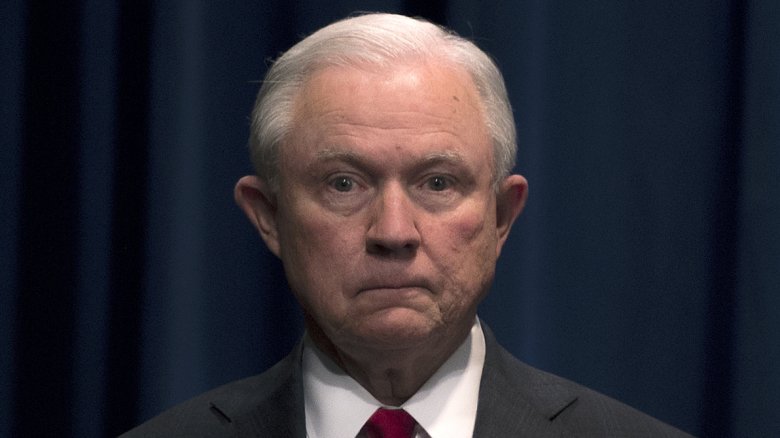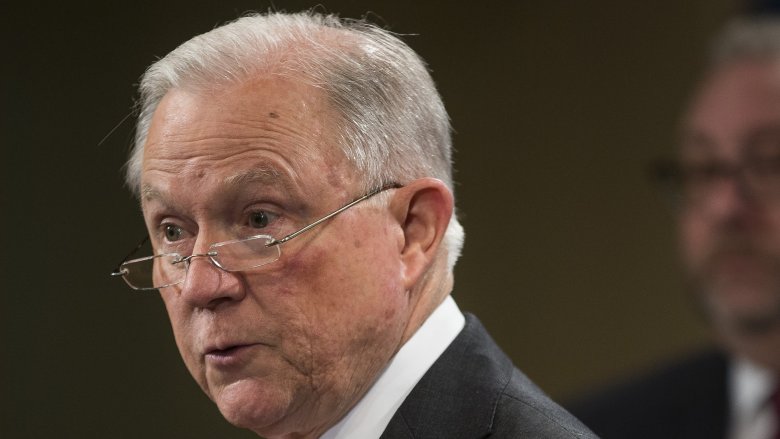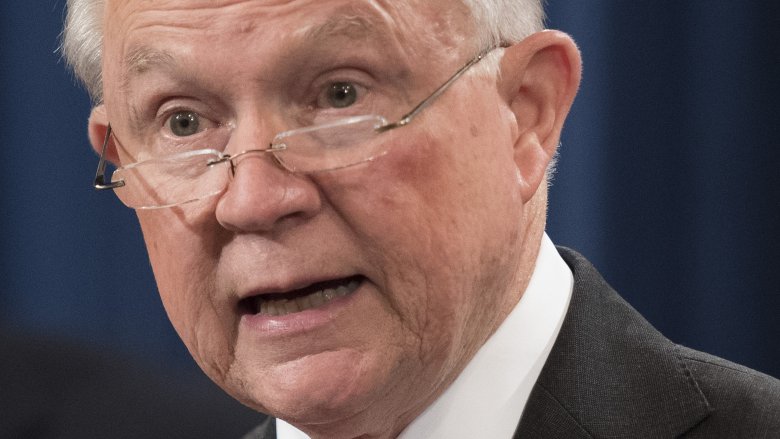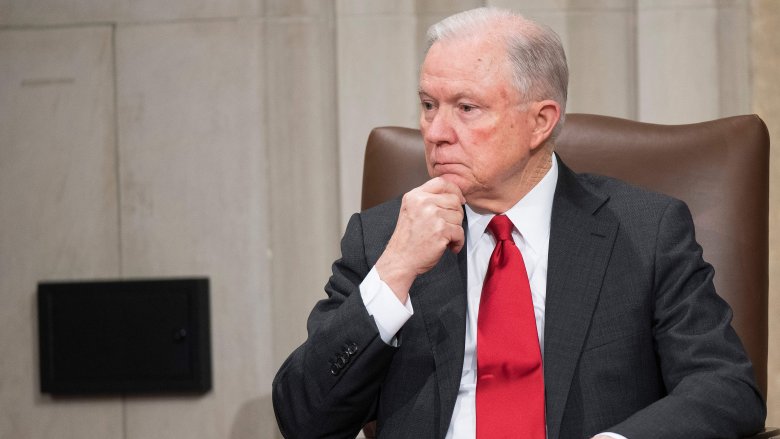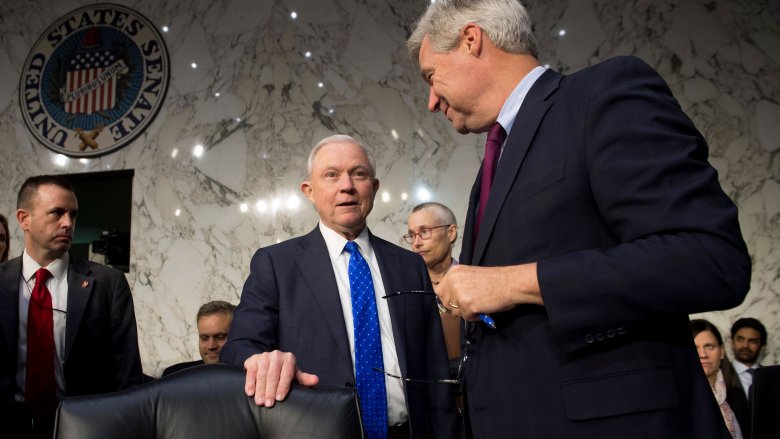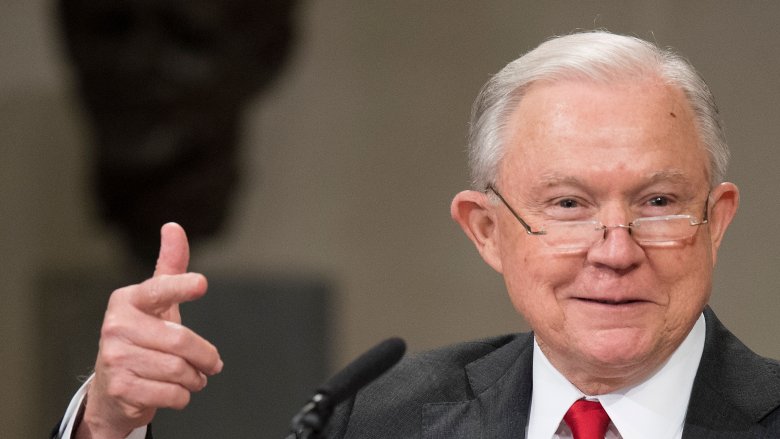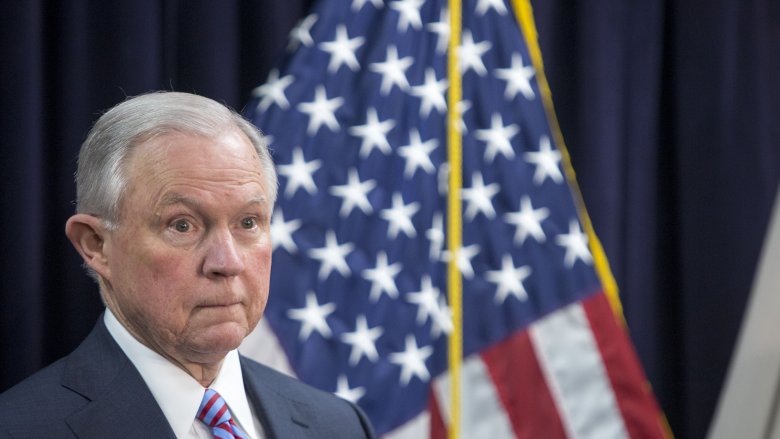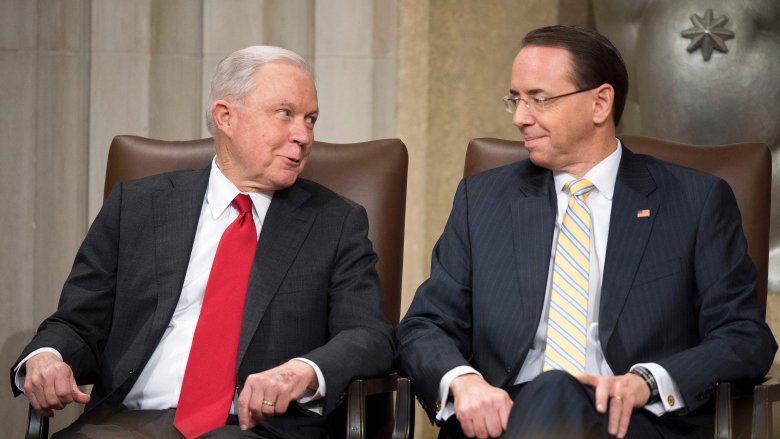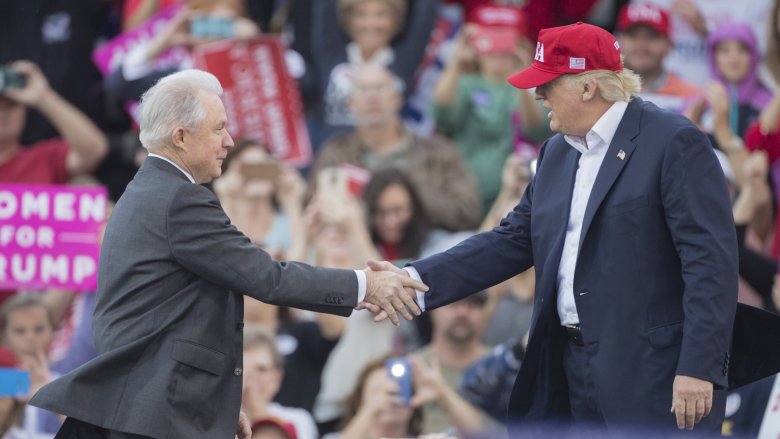The Untold Truth Of Jeff Sessions
You probably know him as the sad face constantly peering out under headlines with the word "controversy" in them. Jeff Beauregard Sessions (the third, no less) has a good claim to being one of the most contentious people to ever hold the post of U.S. attorney general. Before Donald Trump booted him out on the latest episode of ongoing reality show The President's Apprentice, Sessions had been the driving force behind such comically unpopular policies as separating immigrant children from their parents and promoting the government's right take all your stuff and add it to their budget (also known as civil forfeiture). And that's before we even touch on his policy of luring children into his gingerbread house to eat them. (Okay, that one's a joke.)
Despite this illustrious record, though, most people who've been paying attention lately probably just know Jeff Sessions for his less than happy relationship with Donald Trump, the man who put him in power. Sessions, who was Trump's first supporter in the Senate, recused himself from the Russia probe, which really ticked off the big guy. Now he's finally been pushed out after a lot of hints from Trump. But there's plenty more to know about the dude. Here's the untold truth of Jeff Sessions.
His first big case involved prosecuting racists (and it's super complicated)
On the morning of March 22, 1981, residents of Mobile, Alabama, awoke to the ominous sign of a flaming cross burning on the courthouse lawn. Swinging from a tree a few blocks away was the lifeless body of 19-year-old Michael Donald. He'd been badly beaten, his throat slashed. The noose around his neck had been knotted 13 times, a Klan signature. You can probably guess how Mobile's police force reacted. Yep, they began investigating the theory that Donald was just a "lowlife black man" who'd stolen drugs and been killed by junkies (via the Atlantic).
The case came to the attention of Thomas Figures, the only black U.S. assistant attorney in Alabama. Figures was working under Jeff Sessions, then overseeing the Southern District of Alabama, and needed Sessions' support to chase a seemingly unsolvable case like this — something that wasn't guaranteed in 1980s Alabama. Sessions agreed. Thanks to the finances and clout of his office, prosecutors were able to catch both of Donald's killers, and one even received the death penalty.
That brings us to the complicated part. Some, such as prosecuting district attorney Chris Galanos have since said it was Sessions and Sessions alone who ensured justice for Michael. But Figures later testified that while Sessions technically helped, he also tried to pressure him into dropping the case. (Sessions disputes this.) The case that made Sessions remains a live issue. Does it prove he's not racist, or does it prove nothing?
His office was the epicenter of a massive controversy over black voter suppression
If you were around in the '80s, you might remember that Jeff Sessions failed to get nominated to the federal judiciary in 1986. But do you remember the story behind that embarrassingly failed bid? Well there were some comments about the KKK and a timely intervention from Martin Luther King's widow, but also, in 1985, the federal government launched a crackdown on voting irregularities in the "Black Belt." Sessions' office spearheaded the investigation into Alabama's Perry County Civic League, a black voting organization in one of the state's smallest, most rural counties. They charged three community leaders with voter fraud, including a former aide to Martin Luther King Jr. The case they tried to prove? Err, that legally filling in ballots for illiterate voters constituted voter fraud (via Washington Post).
The case was so laughably weak that it's remarkable the other cases being heard that day didn't beat it up and steal its lunch money. It became a massive cause celebre for people in the civil rights movement, who thought it was an attempt to stop black people from voting. Sessions' evasive answers about it in 1986 didn't convince many otherwise.
But! It's actually not clear how much Sessions was really involved with this. Washington Post says he handed the case off and only became actively involved when he saw it was about to collapse. The son of one of the men prosecuted even told CNN in 2017 that he didn't think the case was racially motivated. It was certainly stupid, though.
That time he tried to use sodomy laws to stop LGBT student meetings
In 1992, Alabama passed Education Code Section 16-1-28, which feels like a ZIP code but was actually an extremely nasty piece of legislation. It barred universities from allowing the discussion of anything that might promote "sodomy" on their campuses, which had the effect of basically kicking LGBT groups off campus. Three years later, the Gay Lesbian Bisexual Alliance of the University of Alabama decided this law could kiss their fabulous backsides and voted to hold their conference on campus anyway. Word got back to Alabama Attorney General Jeff Sessions, who hit the roof.
As Slate details, Sessions made it his personal crusade to keep such flamboyant displays — an interfaith panel on LGBT issues and a workshop on coming out — from gaying all over Alabama's public spaces. "But wait!" You cry, "surely he was just following the law?" To which the answer is yep, absolutely ... at first. Sadly for Sessions, the University of South Alabama's Gay Lesbian Bisexual Alliance had sued the state over the law, saying it robbed them of their right to free speech. The judge agreed and invalidated Section 16-1-28 in January 1996. Sessions kept fighting to get the now-legal conference shut down.
Of course, he failed. But the vehemence with which he fought the judiciary was spectacular, including a claim that the conference would cause criminality to spread across the state. Because nothing says "crime" like a panel discussion on preventing STDs in the gay community.
He has an unexpectedly bipartisan track record
In the context of someone like Jeff Sessions, you'd expect "bipartisan voting" to be code for "forcing himself to vote alongside the GOP's moderate wing." Remember, this is the guy who voted against a defense authorization bill because it contained a clause making it a hate crime to assault gay people (via Politico). But we would just be shooting fish in an extremist barrel if we only highlighted Sessions' questionable track record. Nah, we want you to learn stuff about him you never expected, like the fact his Senate voting record contains some surprising moments of compromise.
The most surprising of all is probably the time he cosponsored the Fair Sentencing Act in 2010, reducing the automatic jail time for crack cocaine possession so it came closer to that for regular cocaine. Crack sentences used to be charged at a 100:1 ratio against cocaine sentences. That meant anyone caught with 5 grams of crack recieved a sentence equal to getting caught with 500 grams of coke (via Independent). This disproportionately affected the black community, and Sessions' bill helped get it reduced to 18:1.
2010 was also the year Sessions worked with Sen. Claire McCaskill (D-Mo.) to produce a bipartisan federal spending bill that failed by just one vote. He also voted to retain the Voting Rights Act in 2006, which protects minority voting rights, although his record on the subject was mixed before he joined the Senate. Once again, it's complicated.
The stuff he voted against is absolutely eye-popping
To call Jeff Sessions' voting record in the Senate "occasionally controversial" would be like calling the Sun itself "kinda on the hot side." As an Alabama senator, the now ex-attorney general planted his questionable flag on votes against anything that even vaguely smacked of progressivism. While a ton of these votes (against Obamacare, for example) weren't out of line with the rest of his party, some were jaw-dropping.
In 2013, Senator Sessions voted against reauthorizing the Violence Against Women Act. Introduced in 1994, the bill diverts federal funds to help those experiencing domestic violence. To be fair, Sessions helped pass the bill two times in his career, in 2000 and 2005. But, as Mother Jones recalls, some small changes in 2013 made him one of just 22 senators to vote against it. The main changes were additional help for LGBT, immigrant, and Native American survivors of domestic violence.
Voting against stuff that smacks of gayness is a recurrent theme in Sessions' record. He voted against the Matthew Shepard and James Byrd Jr. Hate Crimes Prevention Act, named after a gay man who was basically tortured to death and a black man killed by white supremacists. But wait! There's also an anti-immigrant theme in this symphony of hate. In 2013, Sessions also became the biggest opponent of bipartisan immigration reform, attacking a bill that would have offered a citizenship path to illegal immigrants and simultaneously increased border security.
His own church publicly accused him of child abuse
Jeff Sessions is a member of the United Methodists Church, which proved to be extremely uncomfortable in mid-2018 following the crisis over border detentions. That June, over 600 clergy and members of the church wrote an open letter to the heads of Sessions' two congregations, asking them to investigate and discipline him under church law. They accused him of breaking the church's teachings by displaying immoral behavior, misrepresenting the Bible, and showing racial bias. Oh, and they also totally called him a child abuser.
Time has the story. The UMC has semi-legal mechanisms it can use to discipline members, starting with a reconciliation process and progressing to something like a trial. Such a letter from members can trigger this process, so it was a serious deal. In this case, the UMC petitioners evidently felt it was justified. The child abuse they referred to meant those immigrant children detained at the border while their parents were shipped back to Mexico or elsewhere. Man, who knew the Methodists were so politically engaged?
Well, that's the thing. They're not meant to be. On August 8, the UMC dropped all charges against Sessions on the basis that the church cannot govern its members' political conduct, only their personal conduct (via the Hill). Not that the problem went away. As late as November 2, Christianity Today was reporting on the ongoing grassroots push among church members to discipline Sessions for enforcing Trump's policies. But now they may not have that particular problem anymore.
His DOJ led a surprising crackdown on hate crimes
If there's an overriding character arc in the Netflix drama of Sessions' life, it's that he really doesn't like hate crime laws. So, if you were plotting the narrative of his time in office, you'd probably sketch a whole load of scenes where he sat around refusing to prosecute homophobic and racist crimes. Well, that's where real life trumps scriptwriting because under Sessions, the DOJ actually cracked down on hate crime. Hard.
Kind of a neat twist, huh? As the New York Times details, Sessions relentlessly chased anyone who broke the laws he'd previously voted against. Three Texans who plotted to seduce gay people online and attack them were charged under hate crime laws, as was another dude from Texas who tried to burn down a mosque. That's two of Sessions' personal bugbears right there: gay people and religions that aren't Christianity. Either he changed his mind in office or he just really hates Texans.
Friends of Sessions told the Times this supposed about-face was no such thing. Sessions was always committed to upholding the law, even when he personally disagreed with it. Nevertheless, in many cases he went above and beyond, like when a white supremacist rammed his car into protestors in Charlottesville in 2017. While the White House hemmed and hawed, Sessions led the government in condemning the assault as an act of domestic terrorism and had his DOJ relentlessly pursue the attacker for violating hate crime laws. Jeff's a complex guy.
He was planning for Trump years before Trump came along
Cast your mind back to the halcyon days of 2015, and the moment Donald Trump announced his candidacy by gliding down a gold elevator to declare Mexicans were criminals, like racist Jesus descending from Heaven to preach a bit of hate. Did it seem odd how such bonkers ideas quickly found an audience? Only if you hadn't been paying attention to the fringes. On the outer edges of acceptable discourse, two key players had long been preparing for this moment: Steve Bannon and Jeff Sessions.
Journalist Emily Bazelon has the story. Back in 2013, nativism and nationalism were so far outside the mainstream that their only semi-respectable home was Bannon's website, Breitbart. Bannon had been banging the nationalist drum for a couple years without much luck when Jeff Sessions burst onto the media landscape by opposing bipartisan immigration reform. A delighted Bannon forged a partnership with the renegade senator. As Bazelon put it, the two of them quickly "began laying the groundwork for [Trump's] presidency."
It wasn't a deliberate effort. They didn't have their eyes on a Trump White House or anything. What they did have in mind was a media and political environment where someone with strongly alt-right, nativist views could run for president and win. By 2016, they'd made that a reality. When Sessions became the first senator to endorse Trump, it was just the capstone to a project he'd been working on for years. Nice to see that worked out for him in the end.
